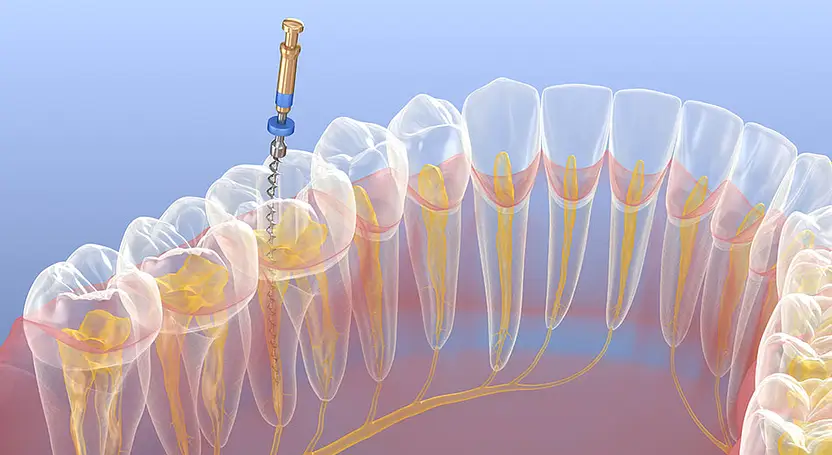What is a Root Canal?
Are you experiencing the discomfort of an aching, inflamed tooth? Root canal therapy can provide relief. Not only will it cleanse and purify your root canal, but we’ll seal off any future infection so that you won’t have to worry about this happening again! Don’t allow yourself to be in pain; take back control with root canal therapy today.
What are the signs of needing a root canal?
If you often experience pain, swelling, or bleeding around a tooth and extreme sensitivity when eating food and drinking hot or cold fluids, then it’s likely time for root canal treatment.
- Sharp pain while chewing or biting
- Pimples on the gums
- A chipped or cracked tooth
- Sensitivity to hot or cold that lingers even after the sensation has been removed.
- Swollen or tender gums
- Deep decay or darkening of the gums
Will I feel pain during or after the root canal?
Root canals are generally performed to lessen the uneasiness caused by an infection or inflammation in a tooth’s pulp. Fortunately, due to sophisticated numbing techniques, most people do not feel any discomfort during and after their procedure.
Post-treatment, you may encounter a few days of sensitivity in your tooth. Pain or infection could be more pronounced if there existed before the procedure. The discomfort and anguish can be alleviated with over-the-counter medications or even prescription drugs if necessary, so heed your dentist’s advice precisely for the best results!
After your endodontic treatment, your tooth may feel slightly different from your other teeth. If you experience severe pain or pressure lasting longer than a few days, it is best to call your dentist.
How much will the root canal procedure cost?
When calculating the cost of this dental procedure, numerous factors must be considered, including which tooth needs treatment and how severe your condition is. Molars often require more detailed care and thus come with a higher fee. Luckily, many dental insurance policies will cover some (if not all) endodontic therapy expenses.
In general, endodontic treatment and restoration of the natural tooth cost less than extracting the tooth. If a tooth is removed, an implant or bridge must be placed to support the teeth on either side and enable chewing. These alternative procedures can often cost more than endodontic treatment and restoration.
After the procedure, will the tooth need any special care or additional treatments?
To protect your treated tooth from fracturing, you should book an appointment with your dentist for a complete restoration as soon as possible. Meanwhile, do not chew or bite down on the treated area until it is restored. Maintaining good oral hygiene habits such as brushing and flossing daily and regular dental checkups are essential for keeping your teeth healthy. Make sure these remain part of your routine!
What can I eat after a root canal?
Following a root canal, try to eat softer foods that don’t require much chewing. This will help you recover quickly and comfortably. This includes applesauce, yogurt, eggs, and fish. Be careful when consuming hard or hot foods to prevent cavities or tooth pain. Some dentists recommend not eating for a few hours until the numbness from dental work fades, so you don’t accidentally bite your cheek or tongue.
Does a root canal kill the tooth?
A root canal may remove the tissue but doesn’t kill the tooth. In fact, after a successful root canal procedure, your treated tooth will return to work just like it did before you had any issues. Although root canals remove the nerves inside a tooth, these nerves are not essential for a fully formed tooth.



